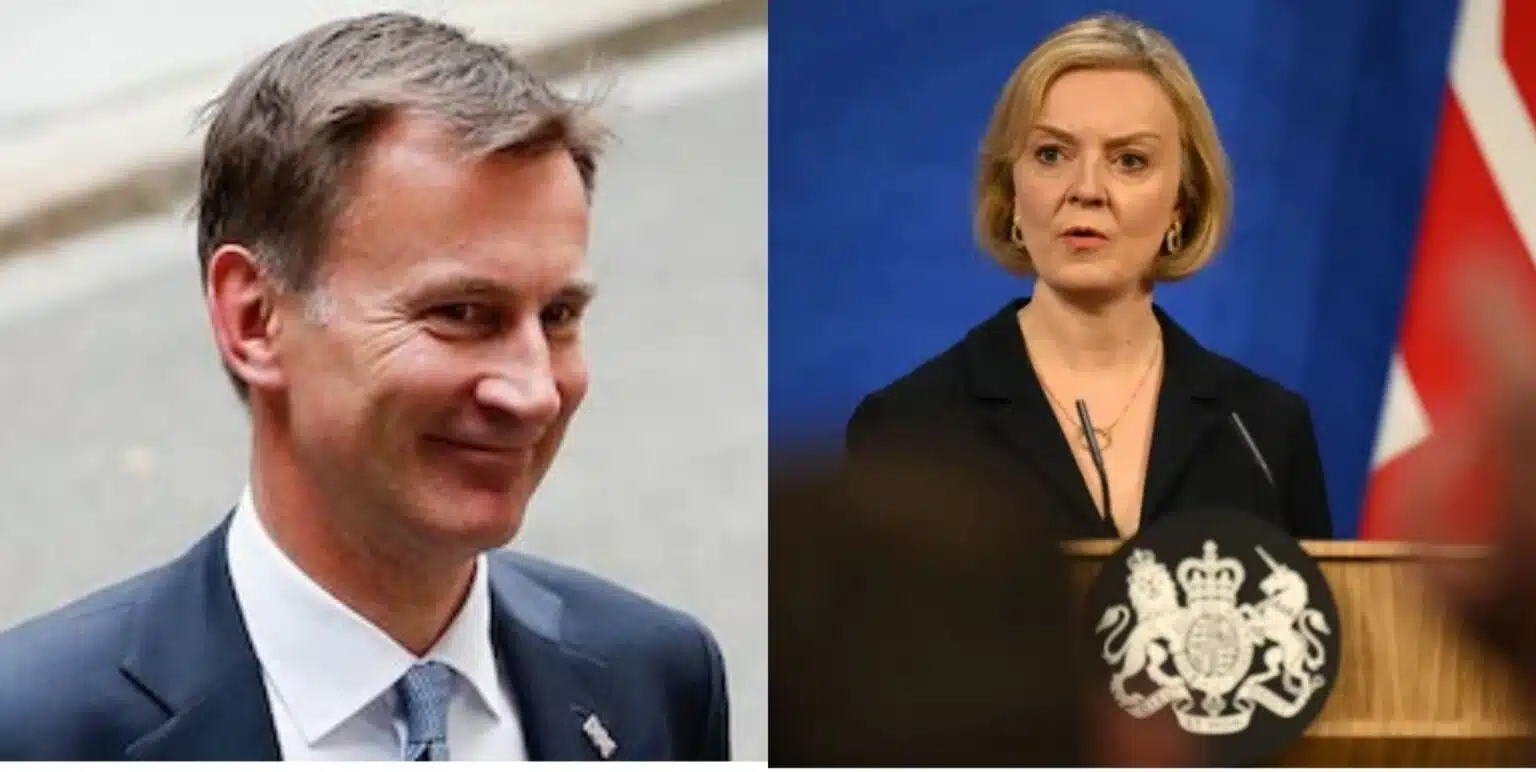Britain’s new finance minister Jeremy Hunt axed almost all of its debt-fuelled tax cuts unveiled last month to prevent fresh markets turmoil, in humiliation for embattled Prime Minister Liz Truss and scaled back her vast energy support scheme, on Monday.

The new finance chief, Jeremy Hunt reverses all of PM Liz Truss’ budget tax cuts
U.K’s new finance chief Jeremy Hunt on Monday, October 17 reversed most of an economic package announced by the government just weeks ago, including a planned cut to income tax and scaled back Liz Truss’ vast energy subsidy, launching one of the greatest fiscal policy U-turns in Britain’s history.
Jeremy Hunt landed the job on Friday by replacing sacked Kwasi Kwarteng who spent less than six weeks in the job, leaving Truss’ position in a problematic state after a series of mortifying U-turns.
Truss had already staged two embarrassing budget U-turns, scrapping tax cuts on company profits and for the richest earners.
He was charged with restraining a dramatic loss of investor confidence and halting a bond market rout, triggered by the government’s declaration on 23 September of huge unfunded tax cuts of 45 billion pounds (Rs 411200 crores)that spooked financial markets, sent the pound to record lows and forced the Bank of England to take emergency action.
Hunt has now scrapped all the policies that helped Ms Truss become Conservative Party leader and premier less than six weeks ago.
The government would take decisions of “eye-watering” difficulty, said Hunt
Truss’s spokesperson denied that Hunt was administering the country after his new strategy sent the pound soaring against the dollar and helped government bond prices start to recover from a three-week pounding.
Mr Hunt said in a television statement, admitting that last month’s budget from his predecessor had harmed the public purse. “A central responsibility for any government is to do what is necessary for economic stability,” adding that they would “reverse almost all the tax measures announced in the growth plan three weeks ago” and signalled public spending cuts are on the way.
He said in the House of Commons on Monday afternoon that to ensure trust and confidence are restored in the country’s finances, the government would take decisions of “eye-watering” difficulty. Also added that they are a country that funds its promises and pays its debts and when that is questioned, as it has been, “this government will take difficult decisions necessary to ensure that there is trust and confidence in our national finances “.

Tough spending cuts
Most of Ms Truss’s Rupees 420120 crores of unfunded tax cuts will go and a two-year energy support scheme for businesses and households is expected to cost well around Rs 933500 crores will now be curtailed in April under the new financial policy. A review will set out a targeted scheme that will “cost the taxpayer significantly less than planned” after that.
Hunt appraised the tax changes would increase about £32 billion ( Rs 296064 crores) per year, after economists estimated the government encountered a £60-billion black hole. He also warned of tough spending cuts.
The chancellor of finance said that no government could control markets but emphasized his action would give certainty over public finances and help in securing growth.
Economists said that the measures would not see through the public finances or undo the damage done by the government’s radical policy, but were a move in the right direction.
Taking to Twitter, UK Prime Minister Liz Truss said, “We have taken action to chart a new course for growth that benefits and delivers for people in the United Kingdom”.
Penny Mordaunt answered questions from MPs on Liz Truss’ behalf as the prime minister did not initially attend parliament on Monday. However, she appeared during Mr Hunt’s statement to the House of Commons, prior to leaving the chamber again.
Ms Mordaunt had earlier told MPs that the prime minister had a genuine reason for being absent but she cannot disclose the reasons and said that Liz Truss was in “wall-to-wall meetings”.
Fight for survival:
The latest crisis in Britain started initially on 23 September, when the newly appointed Ms Truss and her then-finance minister Mr Kwarteng revealed Rs 420120 crores of unfunded tax cuts to snap the economy out of years of recession. They even argued that a huge rise in spending during the pandemic of Covid-19 had set Britain’s tax take on course to reach its top level, since the 1950s.
The response from bond investors who would fund the tax cuts was vehemently negative and borrowing costs rose. Lenders pulled mortgage offers and the Bank of England eventually had to intervene to restrict pension funds from going under.
Ms Truss fired Mr Kwarteng on Friday, after scrapping one of the tax cuts, saying she believed her plans had gone “further and faster” than investors were expecting.
(1 USD= 82.24 Rs)
(1£= 93.35 Rs)
Read More: Best Booker prize 2022 goes to “The Seven Moons of Maali Almeida” by Shehan Karunatilaka.












